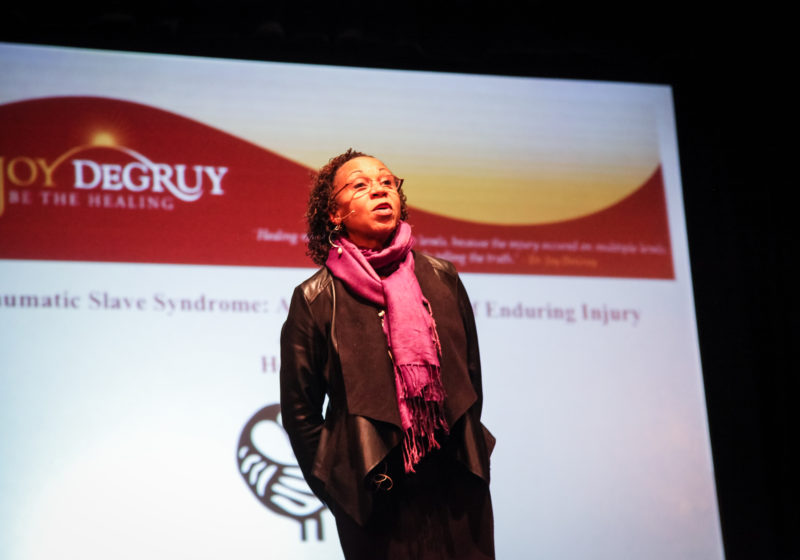Author and educator Dr. Joy DeGruy delved into how America’s history of slavery has caused “post traumatic slave syndrome” in African descendants before a full house Friday evening as UR’s annual Martin Luther King Jr. Commemorative Address speaker.
To explain, she asked the audience to imagine a white mother and a black mother, each with their sons by their sides, sitting next to each other at a meeting.
The black mother compliments the white mother’s son, to which the white mother responds by rattling off her son’s accomplishments and saying she is proud of him.
But when the white mother tells the black mother that it’s her son who is really “coming along,” the latter responds, “You should have seen that boy yesterday, lord he works my nerves,” said DeGruy.
Slave narratives made the reason for this kind of scenario to crop up clear to her: a black slave mother would degrade her child to ward off a potential white purchaser.
“No, he’s stupid, he can’t work,” said DeGruy. “Because I don’t want you to sell him or breed her, I denigrate them to protect them.”
That, DeGruy said, is called “appropriate adaptation” when living in a hostile environment and is a behavior that has yet to be unlearned.
Relating back to her first example, DeGruy said that when the son looks over at his mother and wonders why she can’t be proud of him like the white mother is proud of her son, it’s because he’s unaware of “the secret.”
“By the time he learns it, he’s been injured by it,” DeGruy said. “Post traumatic slave syndrome.”
DeGruy, who along with being a writer and teacher is a public speaker, is known worldwide for her research of the everlasting effects of slavery, which are outlined in her book “Post Traumatic Slave Syndrome: America’s Enduring Legacy of Injury and Healing.”
As much of her workshops and trainings in the area of mental health exemplify, DeGruy’s work is ultimately about healing.
“You cannot heal what you do not understand,” DeGruy said. “In order for healing to occur, the whole being has to heal, and that’s very hard to do.”
The sixteenth annual address, which took place in Strong Auditorium, began with brief introductions by Assistant Dean and Director of the Office of Minority Student Affairs Norman Burnett, followed those of University President Joel Seligman.
In his speech, Seligman emphasized the need for a dialogue on social justice.
“Never in our time together has the kind of topic Dr. Joy DeGruy will address seemed so urgent,” he said.
He also announced that UR will begin a university-wide observance of Martin Luther King Jr. Day in 2018, based on the recommendation of the Commission on Race and Diversity.
He honored the recipients of the 2017 Presidential Diversity Award: Gina Cuyler, internal medicine physician and founder of the Black Physicians Network of Greater Rochester Inc., and Debora McDell-Hernandez, Curator of Engagement at the Memorial Art Gallery.
Junior and President of the Black Students’ Union Caryl English spoke next, formally introducing DeGruy to the stage.
DeGruy began her speech by addressing the urgency of a conversation on race to take place at a time other than during Black History Month.
“It’s not an event,” said DeGruy. “It is all of our history, and it therefore should be expressed and shared all the time.”
She warned the audience that her lecture was going to be intense because she was condensing a 10-week graduate course into an hour, but also simply “because it’s intense.”




